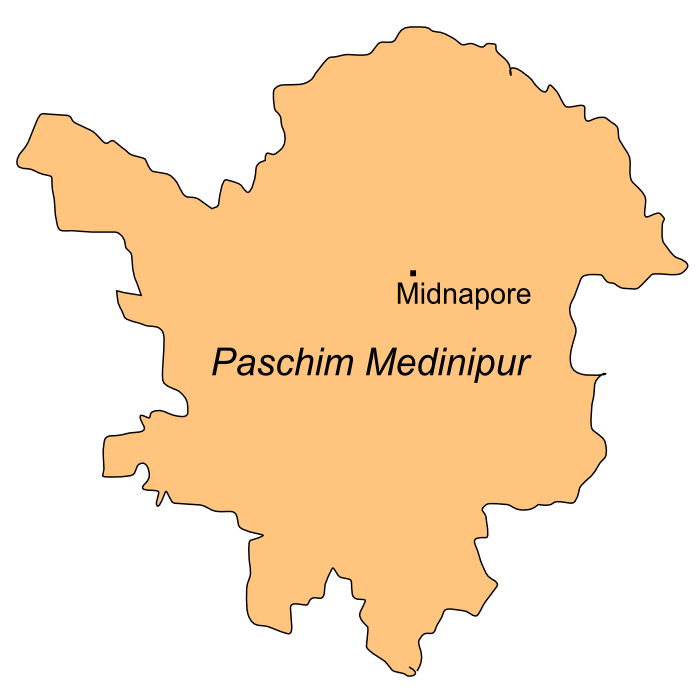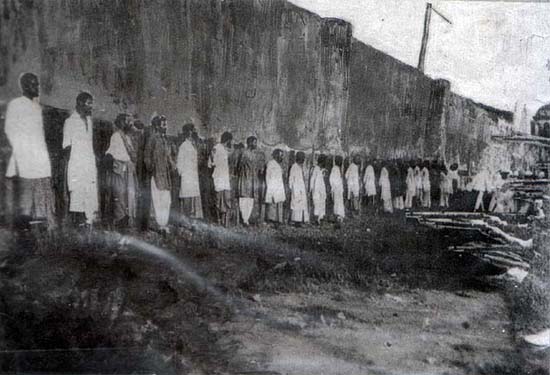|
Prabhanshu Sekhar Pal
Prabhanshu Sekhar Pal (15 July 1913 – 2 June 2007) nick named Jambu, was an Indian revolutionary and member of the Bengal Volunteers who carried out assassinations against British colonial officials in an attempt to secure Indian independence. Family Prabhanshu Sekhar Pal was born in 1913. His father's name is Asutosh Pal and mother's name is Lakhmimani Pal.His father was a doctor and research scholar. Actually his father has his ancestral home at Khanjapur, Daspur, Midnapore. When he was a child he was send to his maternal uncle's house at Midnapore town where he joined the Bengal Volunteers, a revolutionary organisation of British India. He was a close associate of Netaji Subhas Chandra Bose Revolutionary activities After the murder of Magistrate Paddy, Robert Douglas, a ruthless District Magistrate, was posted in Midnapore district.The revolutionaries of the Bengal Volunteers decided to assassinate Douglas because he was responsible for killing two unarmed activis ... [...More Info...] [...Related Items...] OR: [Wikipedia] [Google] [Baidu] |
Midnapore
Medinipur or Midnapore (Pron: med̪iːniːpur) is a city known for its history in the Indian state of West Bengal. It is the headquarters of the West Medinipur district. It is situated on the banks of the Kangsabati River (variously known as ''Kasai'' and ''Cossye''). The Urban Agglomeration of Midnapore consists of the city proper, Mohanpur, Keranichati and Khayerullachak. Midnapore and it's neighbouring city of Kharagpur constitute the central core of the Midnapore Kharagpur Development Authority metro area, spread across 576 square kilometres. Etymology The English name Midnapore is a corruption of the original name of the town which was Madanipur. It was named after Haji Mustafa Madani, a 17th-century Bengali Muslim scholar who was gifted tax-free land in the present area in addition to an estate there which included a mosque. Madani is the ancestor of Mohammad Abu Bakr Siddique of Furfura Sharif. According to Sri Hari Sadhan Das, the city got its name from Medinikar, the f ... [...More Info...] [...Related Items...] OR: [Wikipedia] [Google] [Baidu] |
2007 Deaths
This is a list of deaths of notable people, organised by year. New deaths articles are added to their respective month (e.g., Deaths in ) and then linked here. 2022 2021 2020 2019 2018 2017 2016 2015 2014 2013 2012 2011 2010 2009 2008 2007 2006 2005 2004 2003 2002 2001 2000 1999 1998 1997 1996 1995 1994 1993 1992 1991 1990 1989 1988 1987 See also * Lists of deaths by day * Deaths by year {{DEFAULTSORT:deaths by year ... [...More Info...] [...Related Items...] OR: [Wikipedia] [Google] [Baidu] |
Bengali Politicians
Bengali or Bengalee, or Bengalese may refer to: *something of, from, or related to Bengal, a large region in South Asia * Bengalis, an ethnic and linguistic group of the region * Bengali language, the language they speak ** Bengali alphabet, the writing system ** Bengali–Assamese script *** Bengali (Unicode block), a block of Bengali characters in Unicode * Bengali, Nancowry, a village in Andaman and Nicobar Islands, India * , a ship launched in 1837 and wrecked in 1951 * Bengali, member of the ThunderCats * Bengali-Fodé Koita, Guinean footballer * Bengali Keïta, Guinean centre-back * Bengali Market, ancient market in New Delhi, India * Bengali River, river in northern Bangladesh * Bengali Singh, Indian politician * Abdul Wahid Bengali ʿAbd al-Wāḥid Bengālī ( bn, আব্দুল ওয়াহেদ বাঙ্গালী; c. 1850—1905) was a 19th-century Muslim theologian, teacher and social reformer. He was one of the initiators of the Deobandi movemen ... [...More Info...] [...Related Items...] OR: [Wikipedia] [Google] [Baidu] |
People From Paschim Medinipur District
A person ( : people) is a being that has certain capacities or attributes such as reason, morality, consciousness or self-consciousness, and being a part of a culturally established form of social relations such as kinship, ownership of property, or legal responsibility. The defining features of personhood and, consequently, what makes a person count as a person, differ widely among cultures and contexts. In addition to the question of personhood, of what makes a being count as a person to begin with, there are further questions about personal identity and self: both about what makes any particular person that particular person instead of another, and about what makes a person at one time the same person as they were or will be at another time despite any intervening changes. The plural form "people" is often used to refer to an entire nation or ethnic group (as in "a people"), and this was the original meaning of the word; it subsequently acquired its use as a plural form of p ... [...More Info...] [...Related Items...] OR: [Wikipedia] [Google] [Baidu] |
Indian Revolutionaries
Indian or Indians may refer to: Peoples South Asia * Indian people, people of Indian nationality, or people who have an Indian ancestor ** Non-resident Indian, a citizen of India who has temporarily emigrated to another country * South Asian ethnic groups, referring to people of the Indian subcontinent, as well as the greater South Asia region prior to the 1947 partition of India * Anglo-Indians, people with mixed Indian and British ancestry, or people of British descent born or living in the Indian subcontinent * East Indians, a Christian community in India Europe * British Indians, British people of Indian origin The Americas * Indo-Canadians, Canadian people of Indian origin * Indian Americans, American people of Indian origin * Indigenous peoples of the Americas, the pre-Columbian inhabitants of the Americas and their descendants ** Plains Indians, the common name for the Native Americans who lived on the Great Plains of North America ** Native Americans in th ... [...More Info...] [...Related Items...] OR: [Wikipedia] [Google] [Baidu] |
Indian Nationalism
Indian nationalism is an instance of territorial nationalism, which is inclusive of all of the people of India, despite their diverse ethnic, linguistic and religious backgrounds. Indian nationalism can trace roots to pre-colonial India, but was fully developed during the Indian independence movement which campaigned for independence from British rule. Indian nationalism quickly rose to popularity in India through these united anti-colonial coalitions and movements. Independence movement figures like Mahatma Gandhi and Jawaharlal Nehru spearheaded the Indian nationalist movement. After Indian Independence, Nehru and his successors continued to campaign on Indian nationalism in face of border wars with both China and Pakistan. After the Indo-Pakistan War of 1971 and the Bangladesh Liberation War, Indian nationalism reached its post-independence peak. However by the 1980s, religious tensions reached a melting point and Indian nationalism sluggishly collapsed. Despite its ... [...More Info...] [...Related Items...] OR: [Wikipedia] [Google] [Baidu] |
Revolutionary Movement For Indian Independence
The Revolutionary movement for Indian Independence was the part of the Indian independence movement comprising the actions of violent underground revolutionary factions. Groups believing in armed revolution against the ruling British fall into this category, as opposed to the generally peaceful civil disobedience movement spearheaded by Mohandas Karamchand Gandhi. The revolutionary groups were mainly concentrated in Bengal, Maharashtra, Bihar, the United Provinces and Punjab. More groups were scattered across India. Beginnings Apart from a few stray incidents, the armed rebellion against the British rulers was not organised before the beginning of the 20th century. The revolutionary philosophies and movement made its presence felt during 1905 partition of Bengal. Arguably, the initial steps to organise the revolutionaries were taken by Aurobindo Ghosh, his brother Barin Ghosh, Bhupendranath Datta, Lal Bal Pal and Subodh Chandra Mullick, when they formed the Jugantar party ... [...More Info...] [...Related Items...] OR: [Wikipedia] [Google] [Baidu] |
1913 Births
Events January * January 5 – First Balkan War: Battle of Lemnos (1913), Battle of Lemnos – Greek admiral Pavlos Kountouriotis forces the Turkish fleet to retreat to its base within the Dardanelles, from which it will not venture for the rest of the war. * January 13 – Edward Carson founds the (first) Ulster Volunteers, Ulster Volunteer Force, by unifying several existing Ulster loyalism, loyalist militias to resist home rule for Ireland. * January 23 – 1913 Ottoman coup d'état: Ismail Enver comes to power. * January – Stalin (whose first article using this name is published this month) travels to Vienna to carry out research. Until he leaves on February 16 the city is home simultaneously to him, Hitler, Trotsky and Josip Broz Tito, Tito alongside Alban Berg, Berg, Freud and Jung and Ludwig Wittgenstein, Ludwig and Paul Wittgenstein. February * February 1 – New York City's Grand Central Terminal, having been rebuilt, reopens as the ... [...More Info...] [...Related Items...] OR: [Wikipedia] [Google] [Baidu] |
British India
The provinces of India, earlier presidencies of British India and still earlier, presidency towns, were the administrative divisions of British governance on the Indian subcontinent. Collectively, they have been called British India. In one form or another, they existed between 1612 and 1947, conventionally divided into three historical periods: *Between 1612 and 1757 the East India Company set up factories (trading posts) in several locations, mostly in coastal India, with the consent of the Mughal emperors, Maratha Empire or local rulers. Its rivals were the merchant trading companies of Portugal, Denmark, the Netherlands, and France. By the mid-18th century, three ''presidency towns'': Madras, Bombay and Calcutta, had grown in size. *During the period of Company rule in India (1757–1858), the company gradually acquired sovereignty over large parts of India, now called "presidencies". However, it also increasingly came under British government oversight, in effect shar ... [...More Info...] [...Related Items...] OR: [Wikipedia] [Google] [Baidu] |
Tamra Patra
Tamra ( ar, طمرة, he, טַמְרָה or ) is an Arab city in the North District of Israel located in the Lower Galilee north of the city of Shefa-Amr and approximately east of Acre. In it had a population of . History Tamra is an ancient village on a hill. Old squared stone blocks have been reused in village homes. Cisterns and tombs carved into rock have also been found here. It has been suggested that Tamra is identical to Kefar Tamartha, a Jewish village mentioned in the Talmud as the home of 3rd century amora Rabbi Shila of Kefar Tamarta. Crusader period In the 1253, during the Crusader period, John Aleman, Lord of Caesarea, sold several villages, including Tamra, to the Hospitallers. In 1283 it was mentioned as part of the domain of the Crusaders, according to the ''hudna'' (temporary truce) between the Crusaders in Acre and the Mamluk sultan Qalawun. Ottoman period Tamra, was incorporated into the Ottoman Empire in 1517, and in the census of 1596 the vi ... [...More Info...] [...Related Items...] OR: [Wikipedia] [Google] [Baidu] |
Pradyot Kumar Bhattacharya
Pradyut Kumar Bhattacharya (3 November 1913 - 12 January 1933) was a Bengali revolutionary and activist of the Indian freedom movement. He was hanged in Midnapore Central jail. Revolutionary activities Bhattacharya was born in Midnapore, British India. His father's name was Bhabataran Bhattacharya. He joined in the anti-British movement and Jugantar group while studying in Midnapore College. The revolutionaries of the Bengal Volunteers decided to assassinate ruthless Second magistrate Robert Doglas because he was responsible for killing two unarmed activists in Hijli Detention Camp. On 30 April 1932, Prabhanshu Sekhar Pal Prabhanshu Sekhar Pal (15 July 1913 – 2 June 2007) nick named Jambu, was an Indian revolutionary and member of the Bengal Volunteers who carried out assassinations against British colonial officials in an attempt to secure Indian independe ... and Bhattacharya fired on the magistrate while he was presiding over a meeting of the Zilla District Board. Pal ... [...More Info...] [...Related Items...] OR: [Wikipedia] [Google] [Baidu] |

_1938.jpg)


